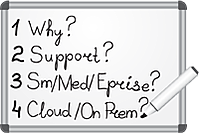Many blog articles have been written answering the question “what to look for when evaluating new accounting systems?”. However, those articles focus on features and functionality, and I believe there are important things to consider before beginning the software selection process. My hunch was recently backed up when a prospect called and asked “what should I consider before looking for new ERP or accounting software?” This question differs subtly from a features and functionality inventory. Therefore, I made a list of:
 10 things CFOs or CIOs should consider before looking for new ERP or accounting software
10 things CFOs or CIOs should consider before looking for new ERP or accounting software
1. Why should my organization implement new accounting software technology?
What will it mean to my company if we make a change? If we don’t make this change, what will that mean to my company? Can I quantify the business decision in dollars? Determining the value proposition of an ERP implementation project should be the primary consideration prior to beginning the process.2. Do I have the support of my outside professionals?
What does my CPA think? What does my trade association think? What do my peers think? When I talk to my peers, are they giving me honest feedback or just wishful thinking or war stories? Every company has many independent supporters who have beneficial experience and wisdom to share.
3. Should I be shopping in the small market, mid-market or enterprise market for my replacement software?
The investment required for a new mid market solution dramatically increases when compared to entry level solutions like QuickBooks or Sage 50. A step up from the mid market to enterprise software requires a similar, even more substantial adjustment of investment and scope. Each company should be very confident in their best place in the ERP marketplace.
4. What architecture is best for my company?
Do I know the difference between on-premise architecture, cloud architecture, or hybrid cloud architecture? What would be best for my company? What impact does the different revenue models make on my decision? Cloud solutions do not lend themselves to a perpetual license, and on-premise publishers yearn to convert to a subscription license model. Generational workforce paradigm changes will shortly force everyone to deal with the realities of the cloud.5. Can I get strong, local support and training?
If I can get that outside expertise, what will it add to the cost of my project? Once I find candidates to provide this support, am I willing to be transparent with them and engage in an honest business conversation? What support and training options do they offer? In the mid and enterprise markets, very few organizations can implement new accounting technology without outside expertise. The margin of success or failure depends as much or more on a relationship with a strong, local service provider than the features and functionality of the chosen software option.
6. Do I know what I like the most about my current solution?
What am I least willing to give up for a change? Have I taken an inventory of what I really appreciate about the system I currently have in place? Never assume that the next solution supports a business process at least as well as my current solution just because it costs more.
7. Do I know what I want the most from my next solution?
What features and functionality am I most interested in getting for all of the effort and investment I am considering? Usually, organizations have no shortage of what they hope for in a new ERP system, and many projects launch on the strength of this awareness alone. Don’t allow a wish list to be the only consideration when contemplating a software selection process.
8. Have I listed out the possible unexpected costs so that I may do my best to avoid them?
What has my professional support network experienced or observed? Do I know the established industry investment norms for this type of project? Will the total cost be less than the value proposition I have determined for the project? Sometimes, unexpected project costs are not considered simply because no one wants to derail the wish list.
9. How long can I expect the new software to be adequate for my company’s needs?
What changes, if any, may result in early functional obsolescence? Will unusual growth, a potential merger, or new regulations limit my company’s opportunity to obtain a return on investment? Absent unusual good fortune or unexpected change and disruption, new ERP software should meet the needs of a company for 10 years.
10. Do I have the commitment to see the project through to completion?
If things go wrong, have I a contingency budget to get the project back on track? An accounting technology change disrupts an entire business to some degree. The cost of the implementation services can be 50% or more of the total cost. Once again, start off on the right foot by determining the project’s value proposition and check against that value proposition along the way.
Decision makers have many considerations to make before the first call to an accounting technology reseller or consultant. Instead of focusing on features or functionality, develop an accurate justification (measured in dollars) for the task at hand (what will it mean to my company if we make this change?). This contributes to a mindset that will see the project through to completion. Certainly, a project of this magnitude ranks along with other major business decisions in terms of risk and reward. Start by determining the reward, and then focus everyone on managing the risk to achieve that value proposition.


